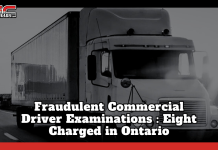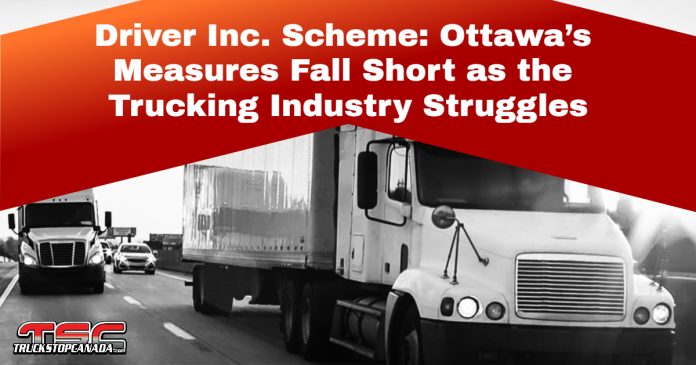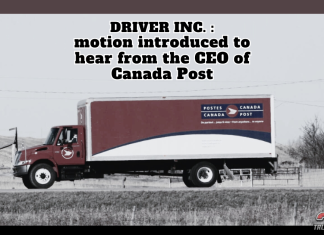As bankruptcies and challenges mount in the Canadian trucking industry, the federal government claims it is taking steps to crack down on the Driver Inc. scheme, while law-abiding carriers continue to lose ground to unfair competition.
Yet on the ground, the reality is different: the measures taken so far remain too limited and too slow to stop a system that’s eroding the very foundation of the sector.
A formal acknowledgment… from the Department of Labour
In response to a request from Truck Stop Canada/TSQ, the Department of Labour—led by Minister Steven MacKinnon at the time of the April 2025 correspondence—confirmed it had implemented measures to fight the improper reclassification of truck drivers as incorporated independent contractors, the very heart of the Driver Inc. model.
The department (ESDC), which oversees the Canada Labour Code, labour standards, wages and employment classifications, stated that it had:
- Established a national enforcement team dedicated to the trucking sector;
- Conducted more than 700 inspections and outreach activities since the team’s creation;
- Issued 362 payment orders totaling nearly $2.5 million in unpaid wages;
- And entered into a formal partnership with the Canada Revenue Agency (CRA) in March 2025 to improve data sharing and law enforcement.
These are steps in the right direction. But within the industry, stakeholders report that despite the announcements, bad actors continue to operate without visible consequences.
CRA remains tight-lipped
The CRA, also contacted by Truck Stop Canada, acknowledged that some companies may fall under the definition of a Personal Services Business (PSB)—a tax classification used when an incorporated worker is effectively functioning as a disguised employee.
However, no concrete data was shared to demonstrate the reach or impact of current enforcement.
The CRA declined to:
- Disclose how many transportation companies had been audited;
- Reveal the penalties imposed;
- Or confirm whether any funds had been recovered from non-compliant companies.
Citing confidentiality, the agency insisted that enforcement is happening, just not publicly. Yet, for those watching honest carriers pushed out of the market by rule-breakers, this lack of transparency leaves a bitter impression.
Finance Canada silent on legislative gaps
While the Department of Finance does not enforce tax laws, it plays a crucial role in shaping the legal frameworks that either enable or prevent schemes like Driver Inc. from flourishing. Still, no targeted announcements or formal commitments have been made to close current loopholes.
The scheme allows carriers to cut operating costs by 20–30% through tax avoidance, skipping employment standards, and reducing insurance and payroll obligations. In Québec, compliant carriers report losing an average of 13.8% in competitiveness—some over 20%.
An ongoing crisis with real consequences
While federal authorities unveil action plans, companies like Trans-West—recognized for compliance and excellence—are forced to lay off staff. Others have already shut down. Fleet owners say they’ve lost clients to firms using Driver Inc. to offer rates that are impossible to match legally.
The consequences are tangible:
- Undertrained, unprotected drivers are sent out on the road;
- Wages are avoided, taxes go unpaid, and private pension and insurance funds are deprived of contributions;
- And in the most tragic cases, lives are lost due to unsafe practices enabled by this system.
The Association des professionnels du dépannage du Québec (APDQ) has reported a rise in incidents involving inadequately trained drivers since early 2025—many recruited under Driver Inc., sent out without proper guidance or safe vehicles. A March 2025 news report exposed the situation, calling it a “time bomb on our roads.”
Far from improving, the crisis continues to strain emergency services.
A national movement pushing back

Despite a firm letter sent by Truck Stop Canada to the CRA and Finance Canada, accompanied by extensive documentation—including testimony from managers, associations, exclusive interviews and concrete examples—no clear commitment has been made. Copies were also sent to various federal and provincial ministers and MPs.
At Quebec’s National Assembly, MNA Monsef Derraji introduced a bill to amend the Highway Safety Code, allowing the SAAQ to partner with other departments to enforce laws related to taxes, immigration, labour standards, occupational safety, and transportation.
Meanwhile in Ottawa, federal officials limit their response to inviting industry stakeholders to submit proposals for the pre-budget consultations, sidestepping questions about widespread tax abuse:
“As the 2025 Pre-Budget Consultations are underway, we would encourage the trucking industry as well as the trucking community, to send us a formal submission at [email protected].” — Department of Finance Canada
“The Government of Canada recognizes the concerns raised by the trucking industry on the subject of tax compliance and driver misclassification in the trucking sector and is taking action to address these concerns.” — CRA
“Incorporating and being hired by another company is not an illegal practice under the Income Tax Act.” — CRA
“The CRA is not able to provide statistics pertaining to payer-worker relationships in the trucking industry.” — CRA
“While enforcement may not always be visible, it is actively taking place. Due to confidentiality and privacy considerations, we are not at liberty to disclose specific enforcement actions or outcomes.” — CRA
And yet, calls to action are growing louder across Canada. Responsible companies are raising the alarm. Provincial and national groups such as the Association du Camionnage du Québec (ACQ), Teamsters Canada, and the Canadian Trucking Alliance are calling for urgent intervention. Professional drivers like Guillaume Lecours have taken to the public stage, writing letters, launching campaigns, giving interviews, and spearheading regional movements to demand an end to regulatory and fiscal impunity.
Even in Brampton, widely seen as the epicenter of the scheme, drivers have taken to the streets to protest exploitative conditions, wage theft, and misclassification tied to Driver Inc.
A competitive edge that kills fairness
The numbers are striking. A nationwide survey by the Canadian Trucking Alliance (CTA) of 83 companies operating over 10,600 trucks found that more than one-third of driver applicants requested to work under the Driver Inc. model—even without owning a truck or assuming the costs of self-employment.
In Ontario, the trend is worse: nearly 50% of applicants apply exclusively under this model, and two-thirds walk away if told the company operates legally.
As CTA President Stephen Laskowski put it: “Government inaction has made legality feel almost abnormal.” The result: compliant carriers are pushed out, while rule-breakers dominate.
The industry is asking for fairness—not favours
Trucking professionals aren’t asking for the moon. They’re simply asking for the law to be enforced—fairly and visibly. For rule-breakers to be identified, penalized, and removed from the market if they persist.
Because as long as the federal government allows the Driver Inc. model to spread unchecked, honest carriers, skilled drivers, road safety, tax fairness—and all Canadians—will keep paying the price.
“Fraudsters continue to operate illegally with impunity in Québec. They threaten not only the economic health of our companies but also the safety of road users.” — Marc Cadieux, President of the Association du camionnage du Québec (ACQ)
This is no longer a technical or fiscal debate. It’s a matter of justice, safety, and economic survival for a critical part of the Canadian transportation sector.
How far must we go before the lived reality of compliant carriers, honest drivers, and exploited foreign workers is finally heard—and taken seriously? When government action feels like motion without impact, can we still call it commitment?
Meanwhile, both small family businesses and established fleets that follow the rules are being forced to downsize or shut down. Skilled truckers are replaced by undertrained workers sent onto the roads without support. Accidents are rising. Billions in unpaid taxes, pensions, and insurance contributions are lost annually.
If nothing changes—who will answer for this negligence?














